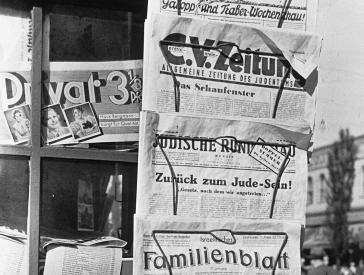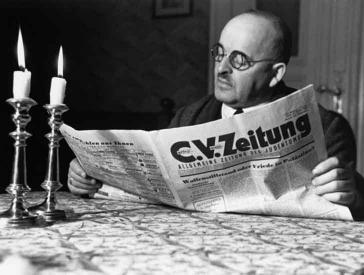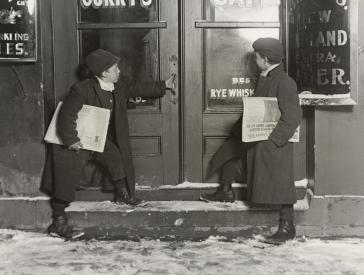This year’s Prize for Understanding and Tolerance will be awarded to German Minister of Foreign Affairs Heiko Maas and the artist Anselm Kiefer
Press Release, Thu 31 Oct 2019
On Saturday, November 16, 2019, the Jewish Museum Berlin will present the Prize for Understanding and Tolerance for the eighteenth time. This year’s prize will go to German Minister of Foreign Affairs Heiko Maas and the artist Anselm Kiefer. Author and journalist Carolin Emcke will give the award presentation speech for Heiko Maas and the author, filmmaker, and lawyer Alexander Kluge will give the speech for Anselm Kiefer. Martin Michaelis, Managing Director of the Jewish Museum Berlin, will present the awards.
- Kontakt
-
Press office
T +49 (0)30 259 93 419
presse@jmberlin.de
- Address
Jewish Museum Berlin Foundation
Lindenstraße 9–14
10969 Berlin
The Prize for Understanding and Tolerance
Since 2002, the Prize for Understanding and Tolerance has been awarded to individuals from business, culture, and politics who have rendered outstanding service in the interest of promoting human dignity, international understanding, the integration of minorities, and the coexistence of different religions and cultures. The prize is traditionally presented at a gala dinner, awarded jointly by the Society of Friends and Sponsors of the Jewish Museum Berlin Foundation and the Museum.
From the jury's statement on the selection of the Minister of Foreign Affairs: “As a politician and minister, Heiko Maas has always spoken out in favor of a unified Europe. Very early on, he didn't mince words in the fight against rising right-wing populism. His political and personal engagement against anti-Semitism and his untiring public advocacy for Jewish life in Germany left a deep impression on the jury composed of the board of the Society of Friends and Sponsors of the Jewish Museum Berlin Foundation.”
“With his monumental works, in which he grapples intensively with the crimes of the National Socialists, as early as 1969 Anselm Kiefer broke the German silence about National Socialism and responsibility for the Holocaust. His decades-long engagement with various creation myths and Jewish mythology resulted in works that not only enraptured the art world, but also restored Jewish culture as an integral part of German society in the collective consciousness,”
according to the jury's statement on their decision to honor the artist with the prize.
Prizewinner Heiko Maas
Heiko Maas was born in 1966 in Saarlouis, near the French border. As a law student at Saarland University, he joined the SPD in 1989. From 1994 to 2003, Heiko Maas was a member of the Landtag of Saarland, holding several offices, including that of Minister of the Environment, Energy, and Transportation; Minister for Economic Affairs, Energy, and Transportation; as well as Deputy Minister President in Saarland. With the beginning of the Grand Coalition, he was named Federal Minister for Justice and Consumer Protection in 2013. In this role and within the framework of the Rosenburg Project, he championed a reappraisal of the National Socialist history of the Federal Ministry of Justice.
For his engagement, in 2014 he received the Israel Jacobson Prize of the Union of Progressive Jews in Germany. In his acceptance speech, the SPD politician reminded: “We must never forget the crimes that Germany committed. And we must also never forget the role that the judiciary played in them.”
In 2015, the International Auschwitz Committee honored him with the “Gabe der Erinnerung” [Gift of Remembrance]. For his advocacy for the compensation and rehabilitation of victims of Paragraph 175 of the German Criminal Code, which made sexual acts between males a crime until 1994, he received the 2017 Tolerantia Award. On March 14, 2018, Heiko Maas was named Minister of Foreign Affairs. Shortly after assuming office, he was the first German Minister of Foreign Affairs to visit the Auschwitz-Birkenau memorial in 26 years.
Prizewinner Anselm Kiefer
Anselm Kiefer was born on March 8, 1945 in the air-raid shelter of a hospital in Donaueschingen (Baden-Württemberg). The painter and sculptor, who has lived in France since 1993, is among the best-known and most successful contemporary German artists. His works appeared at the most important contemporary art exhibitions, including documenta (1977, 1982, 1987) and the Venice Biennale (1980), and they are held in the collections of numerous museums worldwide. He was a student of law and Romance studies before leaving university to dedicate himself completely to painting. In 1966, he began his studies in the visual arts in Freiburg under Peter Dreher, then he became a student of Horst Antes in Karlsruhe. Since 1970, he has engaged artistically with Joseph Beuys, who promoted his work and whose action Overcome Party Dictatorship Now Kiefer took part in in 1971.
No other contemporary artist has made the trauma of war and death, German history, and the catastrophe of the Holocaust the content of their work as Anselm Kiefer has. For a long time, he focused on German mythology and its misuse by National Socialism, provoking public discussions very early on. With his 1969 solo exhibition, a series of black-and-white photographs called Occupations, he broke the silence surrounding National Socialism. The photographs show the artist himself in front of ancient tombs or monumental mountain landscapes in countries once occupied by the German Wehrmacht, each time giving the Hitler salute. Between 1983 and 1990, Anselm Kiefer traveled several times to Israel and began to engage intensively with Kabbalah, a mystical tradition in Judaism. In particular, he studied the writings of Gershom Scholem, which contain the most important interpretations of Kabbalah in the German language. The sculpture Breaking of the Vessels emerged from this topic area. With the opening of the new permanent exhibition, beginning on May 17, 2020, the Jewish Museum Berlin will display this large-scale work in a version from 2019. Kiefer has already received many distinctions and accolades for his systematic examination of German history. In 2018, he was the first visual artist to received the Peace Prize of the German Book Trade. In 2009 in Paris, he was honored with the Adenauer-de Gaulle Prize.
A press invitation with further information on accreditation and the schedule for the evening will be sent soon.
Prizewinners 2002–2018
Past recipients of the Prize for Understanding and Tolerance of the Jewish Museum Berlin:
Berthold Beitz, Chairman of the Curatorium of the Alfried Krupp von Bohlen and Halbach Foundation, and Heinrich von Pierer, former Chairman of the Siemens AG Board (2002), former Federal Minister for Internal Affairs Otto Schily and publisher Friede Springer (2003), the entrepren€ Michael Otto and former Federal President Johannes Rau (2004), the art collector and patron Heinz Berggruen and the politician Otto Graf Lambsdorff (2005), Daniel Barenboim, General Music Director of the Berlin State Opera, and the BMW manager Helmut Panke (2006), former Federal Chancellor Helmut Kohl and the historian Fritz Stern (2007), the corporate consultant Roland Berger and the Hungarian Nobel Laureate in Literature Imre Kertész (2008), Franz Fehrenbach, Chairman of the Board of the Robert Bosch GmbH, and Christof Bosch, spokesperson for the family and member of the Supervisory Board of the Robert Bosch Foundation GmbH – both as representatives of the Bosch Group – and the film director Michael Verhoeven (2009), literary scholar Jan Philipp Reemtsma and the business executive Hubertus Erlen (2010), Federal Chancellor Angela Merkel (2011), Klaus Mangold, chairman of the Supervisory Board of Rothschild GmbH (Frankfurt and Moscow), and former Federal President Richard von Weizsäcker (2012), Berthold Leibinger, Trumpf GmbH, and actress Iris Berben (2013), publisher Hubert Burda and German Minister of Finance Wolfgang Schäuble (2014), W. Michael Blumenthal, founding director of the Jewish Museum Berlin (2015), and last year historical eyewitnesses Renate Lasker-Harpprecht and Anita Lasker-Wallfisch, the businessman Hasso Plattner (2016), Joe Kaeser, Siemens President and CEO, Joachim Gauck, former President of the Federal Republic of Germany (2017) and last year, the entrepren€ Susanne Klatten and the writer David Grossman.





